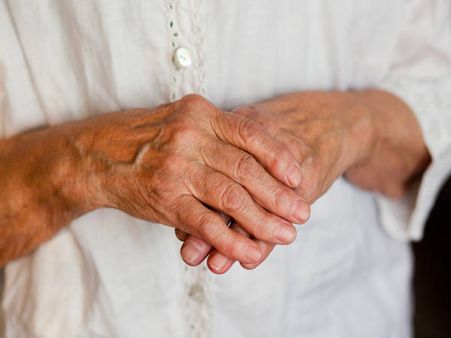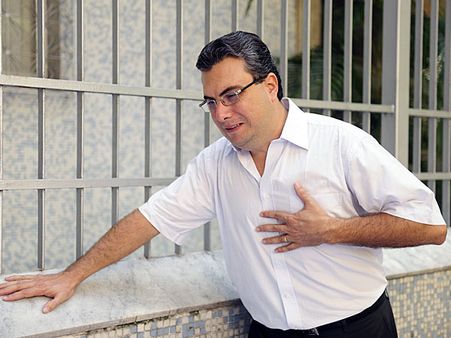Just In
- 46 min ago

- 1 hr ago

- 4 hrs ago

- 11 hrs ago

Don't Miss
- Movies
 Chief Detective 1958 Episode 2 OTT Release Date, Time, Platform: When & Where To Watch? What To Expect? DEETS
Chief Detective 1958 Episode 2 OTT Release Date, Time, Platform: When & Where To Watch? What To Expect? DEETS - Sports
 IPL 2024: LSG vs CSK Award Winners, Man of The Match, Post-Match Presentation, Scorecard & Records
IPL 2024: LSG vs CSK Award Winners, Man of The Match, Post-Match Presentation, Scorecard & Records - News
 Chinese President Xi Jinping Orders Biggest Military Reorganisation Since 2015
Chinese President Xi Jinping Orders Biggest Military Reorganisation Since 2015 - Education
 Exam Pressure Does Not Exist; Studying Punctually is Crucial; Says Aditi, the PSEB 2024 Topper
Exam Pressure Does Not Exist; Studying Punctually is Crucial; Says Aditi, the PSEB 2024 Topper - Finance
 Reliance, ONGC, Tata, Adanis: Energy Stocks Didn't Get The Memo Of Bears, Up 12% In 30-Days; 10 Stocks To BUY
Reliance, ONGC, Tata, Adanis: Energy Stocks Didn't Get The Memo Of Bears, Up 12% In 30-Days; 10 Stocks To BUY - Automobiles
 Suzuki Swift Hatchback Scores 4 Star Safety Rating At JNCAP – ADAS, New Engine & More
Suzuki Swift Hatchback Scores 4 Star Safety Rating At JNCAP – ADAS, New Engine & More - Technology
 Dell Introduces AI-Powered Laptops and Mobile Workstations for Enterprises in India
Dell Introduces AI-Powered Laptops and Mobile Workstations for Enterprises in India - Travel
 Journey From Delhi To Ooty: Top Transport Options And Attractions
Journey From Delhi To Ooty: Top Transport Options And Attractions
Ways To Spot A Heart Attack
A movie takes a tragic turn and a character suddenly faces a gripping pain in his/her chest. The next moment he/she falls to the ground and is pronounced dead. This is what we have been seeing all along and, to a very great extent, believing it also.
In reality, a heart attack does not happen in this overly dramatised manner. Thankfully, there are ways to spot a heart attack before it happens. This further makes it possible for treating a heart attack before it happens.
If we educate ourselves and pay a little more attention, we can prevent a disaster from hitting our lives and families. There are a couple of signs that may be related to a heart attack. In case you have a family history of heart attacks, you need to be all the more careful.
The slightest of signs should be taken seriously and checked. Therefore, never ignore anything that your body is trying to say to you, as it may be an alarming sign in certain cases. Have a look at such signs.

Chest pain:
Chest pain is definitely one of the signals of an in-coming heart attack, but it is not sudden. The pain may be intermittent. Some feel like an immense pressure being applied on to the chest, while others may feel like a huge load being laid on their chest. This gives one enough time to reach a medical practitioner to be attended at the earliest.

Arm pain:
One of the other ways to spot a heart attack before it happens is an arm pain. Usually, it is the left arm that many experience a pain, but the pain may also occur in the right arm in some individuals. Sometimes, the pain can originate in the chest and extend to the arm. When this kind of pain occurs for no obvious reason, be sure to consult a doctor.

Swelling of the legs and feet:
This could again be a bad sign for the heart. When the heart cannot pump blood effectively, it can lead to bloating of the hands and feet. This is because of the blood back up to the veins. Furthermore, a heart failure may also make it difficult for the kidneys to remove the extra amount of sodium and water from the body. This once again results in swelling of the feet and ankles.

Dizziness:
Dizziness in itself may be due to various reasons. It could be due to exhaustion, insufficient sleep or inadequate intake of food and fluids. But, if you feel dizzy, all of a sudden, along with a discomfort in the chest, it could be due to a heart failure.

Irregular heart beat:
Skipping a beat in excitement is different from having irregular beats. When you feel that your heart is not beating normally, or the phenomenon occurs often, it is time to see a doctor. This can help in treating a heart attack before it happens.

Sweating:
Excessive sweating for no obvious reason is a cause of concern. You need to get a medical aid at the earliest. Call your doctor immediately and rush to the nearest hospital. Do not attempt to drive yourself.

Snoring:
Snoring has nothing to do with heart failure, but is still related. If you snore too loudly and display a sign of choking or gasping, you could be suffering from sleep apnoea. This indirectly puts an extra pressure on your heart that may develop into a heart disease.

Persistent cough:
A cough may be the cause of a small weather change, but when it does not reduce for a long time, you need to act. This is especially important if you have had a history of heart disease. Mucus that is pink in colour, or has blood platelets in it, may be the cause of a heart failure, allowing blood to leak into the lungs.
These are a few ways to spot a heart attack before it happens. All you need to do is be a little alert towards your body changes, try to live a healthy lifestyle and keep stress at bay.
-
 beautySalma Hayek's Guide To A Healthy And Happy Life: 5 Secrets Revealed
beautySalma Hayek's Guide To A Healthy And Happy Life: 5 Secrets Revealed -
 beautyHappy Birthday Kajol: 4 Wellness Tips To Learn From Our Beloved ‘Anjali’
beautyHappy Birthday Kajol: 4 Wellness Tips To Learn From Our Beloved ‘Anjali’ -
 wellnessWhat Is Personalized Medicine? Benefits, Why Biobanking Is Necessary
wellnessWhat Is Personalized Medicine? Benefits, Why Biobanking Is Necessary -
 wellnessChiropractic Care: When Do You Need A Chiropractor? Procedure, Benefits
wellnessChiropractic Care: When Do You Need A Chiropractor? Procedure, Benefits -
 wellnessCataract Surgery: Types, Pros And Cons; Expert Explains Everything You Need To Know
wellnessCataract Surgery: Types, Pros And Cons; Expert Explains Everything You Need To Know -
 diet fitnessExpert Shares Creative Ways To Exercise More When Time Is Short
diet fitnessExpert Shares Creative Ways To Exercise More When Time Is Short -
 wellnessHow To Finally Switch Your Sleep Position To End Back Pain
wellnessHow To Finally Switch Your Sleep Position To End Back Pain -
 diet fitnessVintage Fitness Trends That Are Still Effective Today
diet fitnessVintage Fitness Trends That Are Still Effective Today -
 wellnessDangers Of Indoor Tanning: Know Why Is It So Addictive?
wellnessDangers Of Indoor Tanning: Know Why Is It So Addictive? -
 wellnessHow To Get Vitamin D Without Risking Excessive Sun Exposure
wellnessHow To Get Vitamin D Without Risking Excessive Sun Exposure -
 wellnessWays To Deal With Throat Infections This Winter, According To An ENT Specialist
wellnessWays To Deal With Throat Infections This Winter, According To An ENT Specialist -
 wellnessWhy Do Men Most Frequently Report Erectile Dysfunction? Know From An Expert
wellnessWhy Do Men Most Frequently Report Erectile Dysfunction? Know From An Expert


 Click it and Unblock the Notifications
Click it and Unblock the Notifications



